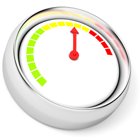Sweaty Palms
Having sweaty palms is the absolute simplest signs of stress. And it also shows that stress isn't all bad: Sweating and sweating in the palms of your hands can occur with even the slightest amount of stress.
Participating in any form of physical activity even will cause you to sweat (perspiration) and so sweat in your hands also.
We sweat because we are hot; your body is constantly regulating its temperature and to cool down it sweats. We all have different amounts we sweat and some do sweat a lot more than others.
Sweat is secreted though sweat glands all over our body, and we have most of these glands in the palm of our hands and on the bottom of our feet. This also helps to explain why sweaty hands is one of the first signs of stress we can notice.
Is it dangerous?
Having sweaty palms on a regular basis - say almost every day, is not something to worry about. Look here for the other signs of stress besides sweaty palms that you can look out for.If, however, you are having sweaty hands for no apparent reason and you also see some of the other signs of stress (see link above) then you should be more conscious about it. Excessive sweat in the palms may well be you indicator of stressful behavior - helping you to recognize when you are about to be stressed.
What can you do?
It is perfectly normal to have sweaty palms - if you have it more than others then it is just the way your body is "constructed"... Did you know that dogs only sweat in their mouth?It is not a very pleasant thing to have sweaty hands though - especially not if you are about to shake hands with your employer or holding hands with your partner.
A good tip is to use odor-free antiperspirant on your palms or where your "problem" is. This is often very effective but you may have to reapply the antiperspirant after you wash your hands... and also; don't eat with your fingers or the taste of chemicals will ruin your sandwich ;)
If the antiperspirant does not rid you of your sweat problem, there are stronger treatments like prescription antiperspirants, powders or Botox - ask your doctor if your "condition" persists.

